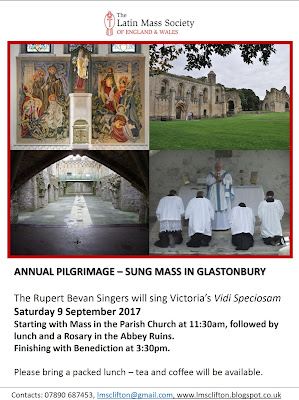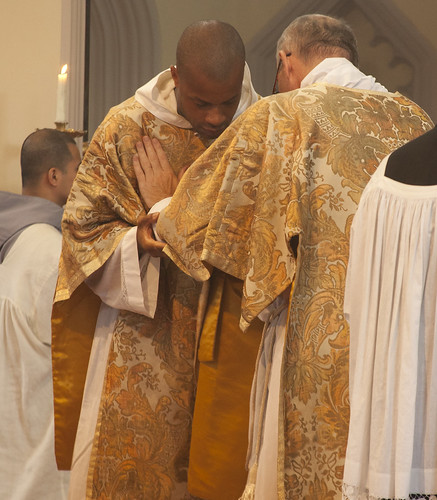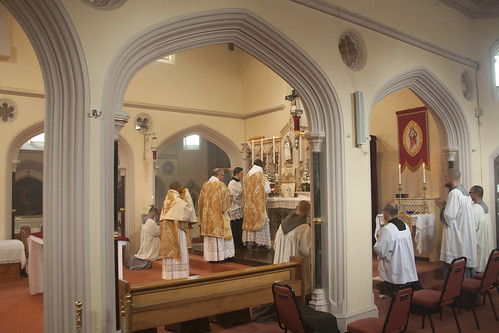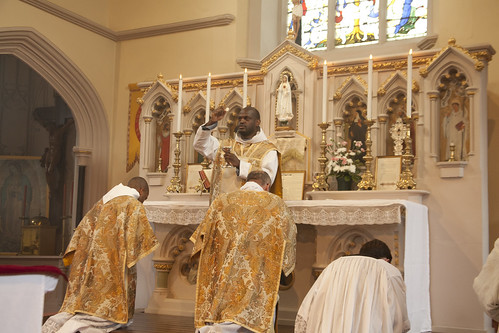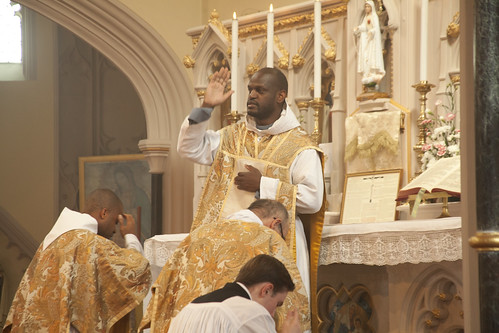Chairman's Blog
Epiphany and Ascension restored to their proper days
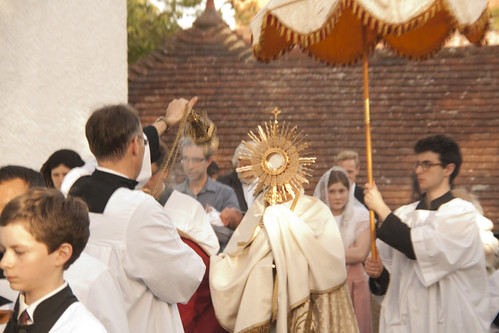 |
| Corpus Christi Procession in Oxford: on the correct day |
As I've noted before, the 2006 decision of the Bishops Conference of England and Wales to celebrate Ascension, Corpus Christi, and Epiphany onthe nearest Sunday in the Ordinary Form is the most unpopular one I can think of in my experience. Letters in the press and blog posts criticising it appear year after year. The few who defended the decision when it was first made long ago gave up trying to respond. It is good to see the bishops are big enough to recognise that they made a mistake, although it is also true that there has been a big turnover of the Conference in the last eight years, and ironically enough today's announcement is accompanied by the news of the death of Cardinal Cormac Murphy O'Connor, the architect of the original decison: requiscat in pace.
Here is the Bishops' Decree. We can now set our sights on restoring Corpus Christi to its proper date, and reversing the decision of 1984 to move the celebrations of all the Holy Days to Sunday when they fall on a Saturday or a Monday (except Christmas). At any rate, it seems we'll have a few more years to advertise the fact that if you want to attend Corpus Christi on its 'particular day' (as the CDW expresses it) you'll have to go to the Traditional Mass.
I've written about the importance of the precise dates here; about the importance of the obligation to attend Mass on these days here. There is a Position Paper on this subject here.
The wheels of the Church grind slowly indeed. The Bishops of England and Wales have been talking about reversing the 2006 decision since at least 2014. I see they made the decision on 17th November 2016, and that the Congregation for Divine Worship received their letter on 21st February. So it took them three months to compose and send the letter. It then too the CDW more than six months to reply, with the paragraph I past in below, simply to allow our bishops to revert, partially, to what is envisaged as the norm by Canon Law (Canon 1246). It then took nearly a whole month for the Bishops' Conference to release the letter from the CDW to the public.
I'm not complaining. I'm just awed.
CONGREGATION FOR DIVINE WORSHIP AND THE DISCIPLINE OF THE SACRAMENTS
Prot. No. 180/17
ENGLAND AND WALES
To His Eminence, Cardinal Vincent Nichols, Archbishop of Westminster, President of the Bishops’ Conference of England and Wales, having taken into consideration the letter received on 21st February 2017, by virtue of the faculty attributed to this Congregation by the Supreme Pontiff FRANCIS, we willingly grant that in future, in the calendar specific to the same Conference, the celebration of the solemnity of the Ascension of the Lord will be celebrated on its particular day, namely, forty days after Easter; the celebration of the Epiphany of the Lord on its particular day, namely, 6th January. When the solemnity of the Epiphany of the Lord falls on a Saturday, it is to be assigned to the Sunday following; when on a Monday, to the Sunday preceding. All things to the contrary notwithstanding. From the offices of the Congregation for Divine Worship and the Discipline of the Sacraments, 4th August 2017, on the feast of St John Mary Vianney, presbyter.
Robert Card. Sarah Prefect
+Arthur Roche Archbishop Secretary
Support the work of the LMS by becoming an 'Anniversary Supporter'.
Irreversible reform? Me in the Catholic Herald this weekend
This weekend the Catholic Herald has a cover story about the Traditional Mass' appeal to young people, by Matthew Schmitz.
Accompanying this is a shorter piece by me on Pope Francis' remarks, make in a speach to a group of Italian liturgists, that the 'reform' is 'irreversible'.
It is not available online, so you'll need to look out for a paper edition. Here's a taster.
Pope Francis’s recent address on the liturgy – about which he has hitherto said little – was striking for its conventionality. In almost every respect, the Pope’s speech hews to the official, post-Vatican II line. It emphasises the continuity of the post-conciliar reform with the efforts of Pius X and XII; it praises the reform for its “vitality”; it condemns liturgical abuses (“deformations”); and it calls for an end to liturgical conflict.
But it has raised eyebrows for its rejection of the possibility of revisiting the “decisions” of the reform in light of its “inspirational principles: an explicit rejection of the “Reform of the Reform” project, which seeks to go back to the Council documents and do the reform again, better. This should be no surprise. In the official mindset, the reform was perfect and was marred only by liturgical abuses. Liturgical progressives should note that the account of the liturgy which follows is entirely traditional, focusing on the altar, the Sacrifice of the Mass, and the Priesthood of Jesus Christ, not even mentioning the Last Supper, the Mass as a shared meal or the liturgy as an affirmation of community.
Pontifical Mass for the 10th Anniversary of Summorum Pontificum in London: 14th Sept
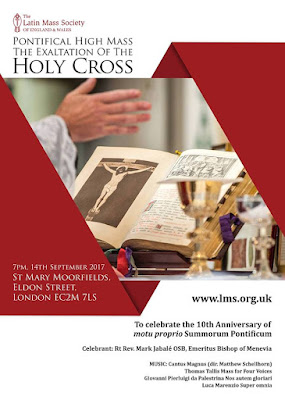 Thursday 14th September, 7pm: Pontifical High Mass in St Mary Moorfields, Eldon Street EC2M7LS
Thursday 14th September, 7pm: Pontifical High Mass in St Mary Moorfields, Eldon Street EC2M7LSTo celebrate the 10th Anniversary of Summorum Pontificum, celebrated by Rt. Rev Mark Jabale OSB, Emeritus Bishop of Menevia.
Music by Cantus Magnus directed by Matthew Schellhorn:
Thomas Tallis (c. 1505 – 1585) Mass for Four Voices
Giovanni Pierluigi da Palestrina (c. 1525 – 1594) Nos autem gloriari
Luca Marenzio (c. 1553 – 1599) Super omnia
Kyrie XI
Support the work of the LMS by becoming an 'Anniversary Supporter'.
Crying rooms in churches: a terrible idea
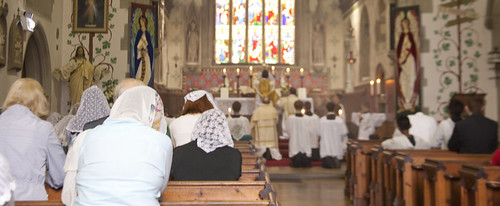 |
| Adults and children kneel for the Consecration at the St Catherine's Trust Summer School |
Last weekend's Catholic Herald carried an article by me about 'crying rooms', spaces sealed off with soundproof glass intended for noisy children and their parents.
I was inspired to write it by realising that the notion of excluding children from the rest of the congregation, or even from Mass entirely, was an idea with a following among not a few conservative and traditionally-minded Catholics. It is a reaction against the experience of chaotic liturgy where children are allowed to wander around, perhaps even into the sanctuary, which I suppose is more associated with a 'progressive' liturgical attitude. The thought would be: if we want a well-ordered, reverent liturgy, we need to get the small children under control; since we can't rely on parents to do this, we should bundle them into a separate space where they won't spoil things for everyone else.
This is short-sighted, however: as I explain the article, children won't learn to behave if shoved into a room where they can behave as badly as they like, and their parents won't learn to discipline them in that context either. Neither the parents nor the children will experience the atmosphere of the liturgy, and both are left with the impression that they are not truly welcome.
I have noted on this blog that another element in the anti-child mindset is the idea that children won't get anything out of the liturgy anyway because the liturgy has to be grasped intellecually in order to have any effect on the worshipper. This, of course, is absurd; indeed I fancy that few people who are influenced by this idea would actually agree with it when set out in black and white. But if it is false, then obviously children, and indeed infants, will benefit from the sacraments and blessings of the liturgy, which is of course why we get babies baptised.
Here's the beginning of the article.
To many people disturbed by children making a noise during Mass, “crying rooms” must seem like an answer to prayer. The children can just go in there, and the problem is solved.
Things look rather different from a parent’s perspective, however. If your noisy child goes into a crying room, with other noisy children, then you have to go as well, and quite probably your other children with you. The problem of the disturbance hasn’t actually been solved: it has been alleviated for most members of the congregation, and made much worse for others. If you haven’t had the incomparable experience of screaming babies in a confined space, you should try some long-haul flights in the holiday season.
Read it all there.
Support the work of the LMS by becoming an 'Anniversary Supporter'.
We're off to Walsingham!
This is a scheduled post: blogging from the road is very difficult. But please remember the Latin Mass Society pilgrims on the road to Walsingham, departing early Friday and arriving lunchtime on Sunday. After Mass in the Catholic Shrine, we walk the last, 'Holy Mile', to the site of the Medieval Shrine, arriving there at about 4:30pm, with many others who've come for the day.
Join us next year!
Support the work of the LMS by becoming an 'Anniversary Supporter'.
Moving Priests: Spetchley and Hethe
| Fr Anthony Talbot in the chapel at Spetchly Park |
Archbishop Longley is moving some priests around in his diocese, and this will effect the provision of the Extraordinary Form in two locations.
Fr Paul Lester is moving away from Holy Trinity, Hethe, and we wish the best in his new parish. He will be leaving on 10th September. It was entirely his initiative to start celebrating the Traditional Mass in the beautiful church of Holy Trinity, and to do so every Sunday, including most recently two Sung Masses a month, and the occasional High Mass with deacon and subdeacon. Among his other achievments as Parish Priest, Fr Lester arranged for Archbishop Longley to celebrate the EF in Holy Trinity, and celebrated Midnight Mass in the church each Christmas.
We are extremely grateful to him for all of this, which has been a tremendous benefit to many supporters of the EF in the area, and to many, indeed, who were able to discover it.
Fr Lester has been in Hethe only three years, but happily what he started will continue.
Fr Anthony Talbot will be moving away from Spetchley Park, where he has been chaplain in the private chapel there. His new role will include celebrating the Traditional Mass in Hethe.
It is a matter of regret that for the moment it would appear that regular Masses will no longer be taking place at Spetchley Park. However, we are very pleased that continuity of the EF at Hethe has been ensured, and I personally look forward to seeing Fr Talbot, a long-standing friend of Tradition, in Holy Trinity. We are very grateful to Archbishop Longley for bearing in mind the needs of the traditional faithful in Hethe, as he juggles his limited resources in his enormous diocese.
If there is a short gap between Fr Lester's departure and Fr Talbot's arrival in Hethe, the Latin Mass Society will do its best to arrange for the regular Sunday Masses at 12 noon to continue without a break.
Support the work of the LMS by becoming an 'Anniversary Supporter'.
Latin Mass Society Pilgrimage to Glasonbury 2017
The Latin Mass Society's annual Pilgrimage to Glastonbury will take place on Saturday 9th September.
It starts at 11:30am with Sung Mass in the Catholic Parish Church, St Mary's, Magdalene St, Glastonbury BA6 9EJ: click for a map.
This is directly opposite the ruins of the Abbey, and pilgrims will as usual have access to the Abbey grounds as part of the pilgrimage.
Support the work of the LMS by becoming an 'Anniversary Supporter'.
High Mass and Family Day at St Mary's Gosport
On Saturday 12th July I attended High Mass in St Mary's, Gosport, where the friars organised a 'family day', with some talks about matters of interest to Catholic families and activities for the children.
I gave a talk about the absence of men from the Church. But here are some photos of Mass.
The celebrant was Fr Pio, the deacon the Rev Stephen Morgan, and the subdeacon Fra Rosario.
Support the work of the LMS by becoming an 'Anniversary Supporter'.
Guild of St Clare: sewing workshops in Oxford
Well, strictly speaking these are in Headington, a suburb of Oxford. But everyone is welcome. Cross-posted from the Guild blog.
Forthcoming autumn events
2nd September: Project Finishing - bring along your unfinished sewing projects and make some progress with the help of our skilled Guild members!
21st October: Embroidery techniques with Jacqui McDonald of the Royal School of Needlework
11th November: Vestment mending and making - we have various altar furnishings, chasubles, and a cope in need of repair. Join us to assist us in mending them, learn about their construction and serve the Church.
All these workshops are taking place at St Anthony of Padua church hall, 115 Headley Way, Oxford OX3 7SS. They run between 10am and 4pm. Tea and cake is provided - please bring your own lunch. For more details or to book a place please email Lucy on lucyashaw@gmail.com.
Support the work of the LMS by becoming an 'Anniversary Supporter'.
Autumn Mass of Ages published
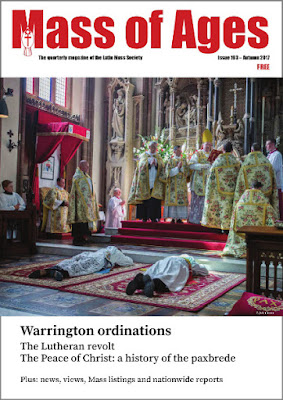 Mass of Ages is the quarterly magazine of the Latin Mass Society. It contains reports on our many activities across the country, national and international news of Traditional Catholic events, feature articles on different aspects of traditional Faith and culture, and opinions and views on developments in the Catholic Church.
Mass of Ages is the quarterly magazine of the Latin Mass Society. It contains reports on our many activities across the country, national and international news of Traditional Catholic events, feature articles on different aspects of traditional Faith and culture, and opinions and views on developments in the Catholic Church.The autumn 2017 edition is now available. The cover article, History in the Making, is a report on the first Ordinations in the Traditional Rite in England for more than 50 years. Other features are Angels and devils, by Canon Amaury Montjean of the Institute of Christ the King Sovereign Priest on the writings of St Francis de Sales, Thirty years of the Old Rite, a history of the Traditional Mass on the Isle of Wight and The Peace of Christ, in which the LMS Chairman, Dr Joseph Shaw, looks at the history of the paxbrede.
• Alberto Carosa talks to Coetus Internationalis Summorum Pontificum Secretary, Guillaume Ferluc, about the forthcoming Summorum Pontificum Pilgrimage to Rome.
• Caroline Shaw looks at El Greco’s The Burial of the Count of Orgaz
• Mary O’Regan on the Third Secret of Fatima
• Paul Waddington, a Vice-President of the LMS, reports on the recent restoration of the wall paintings in the sanctuary and Lady Chapel of Sacred Heart, Caterham.
• Fr Bede Row asks, “Do we still believe in Angels?”
• The Lone Veiler on Holy Communion
Support the work of the LMS by becoming an 'Anniversary Supporter'.


